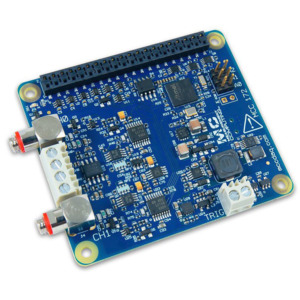
- Description
- Specifications
- Documents
Digilent 172 IEPE Measurement DAQ HAT
Features and Specifications
- Two IEPE inputs
- Two 24-bit, 51.2 kS/s A/D converters (one per channel)
- AC coupled at +/-5 V
- 10-32 and screw terminal connections for OEM support
- Synchronous ADC conversions between multiple boards
- Onboard sample buffers allow high-speed acquisition
- External digital trigger input
- Stack up to eight MCC HATs onto a single Raspberry Pi
Sound and Vibration Measurements From IEPE Sensors
The MCC 172, a voltage Hardware Attached on Top (HAT) board, is specifically designed for the Raspberry Pi, the leading single-board computer in today's market. This add-on board, equipped with a 40W general purpose input/output (GPIO) connector, adheres to the Raspberry Pi HAT specification. It offers two analog inputs for sound or vibration measurements. The unique feature of the MCC 172 is its stackability, allowing up to eight MCC HATs to be stacked onto a single Raspberry Pi which allows users to mix and match MCC HAT models in the stack.
The MCC 172 header is designed to plug into the 40-pin GPIO connector on a Raspberry Pi provided by the user. It has been tested and confirmed for use with all Raspberry Pi models that come with the 40-pin GPIO connector. The HAT configuration parameters are stored in an on-board EEPROM, enabling the Raspberry Pi to automatically set up the GPIO pins upon connection of the HAT.
The MCC 172 HAT provides two 24-bit differential analog input channels that can simultaneously acquire data at rates up to 51.2 kS/s. It allows users to switch the IEPE excitation current on or off as needed. Each channel is equipped with a dedicated A/D converter, and both ADCs share the same clock, ensuring synchronous data as they are synchronized to start conversions at the same time.
Designed for making sound and vibration measurements from IEPE sensors, the MCC 172 is a 24-bit DAQ HAT. It can be synchronized with multiple MCC 172 HATs to a single programmable sampling clock, which can be set for sampling rates between 51.2 kS/s to 200 S/s. The maximum throughput for a single board is 102.4 kS/s (51.2 kS × 2 channels), while for stacked boards, it is 307.2 kS/s in aggregate.
The MCC 172 also features a digital trigger input (terminal TRIG) that can delay an input scan until a specified condition is met at the trigger input. The trigger input signal can be a 3.3V or 5V TTL or CMOS logic signal, and the input condition can be edge or level sensitive, rising or falling edge, or high or low level. This terminal can be used to trigger the start of an acquisition on multiple synchronized MCC 172 HATs.
The MCC 172 is powered with 5 V provided by the Raspberry Pi through the GPIO header connector. For OEM support, users can connect analog input signals to either the 10-32 coaxial inputs or to the screw terminals, but only one source may be connected to a channel at a time.The MCC DAQ HAT Library, an open-source library of commands in C/C++ and Python, allows users to develop applications on the Raspberry Pi using Linux. This library, available for download from GitHub, comes with comprehensive API and hardware documentation. It supports operation with multiple MCC DAQ HATs running concurrently and provides console-based and user interface (UI) example programs for each API.
What's in the Box
- MCC 172 IEPE Measurement DAQ HAT
